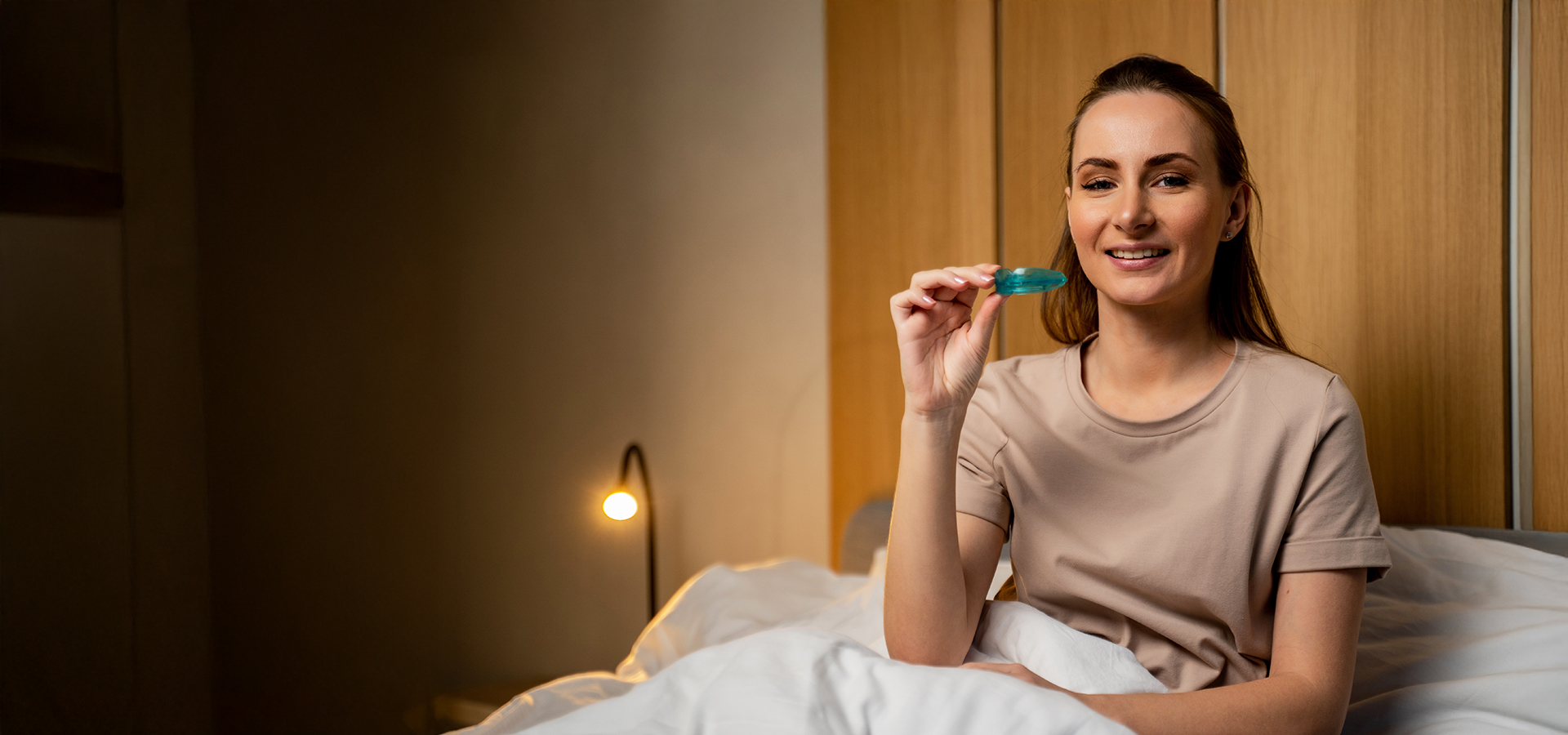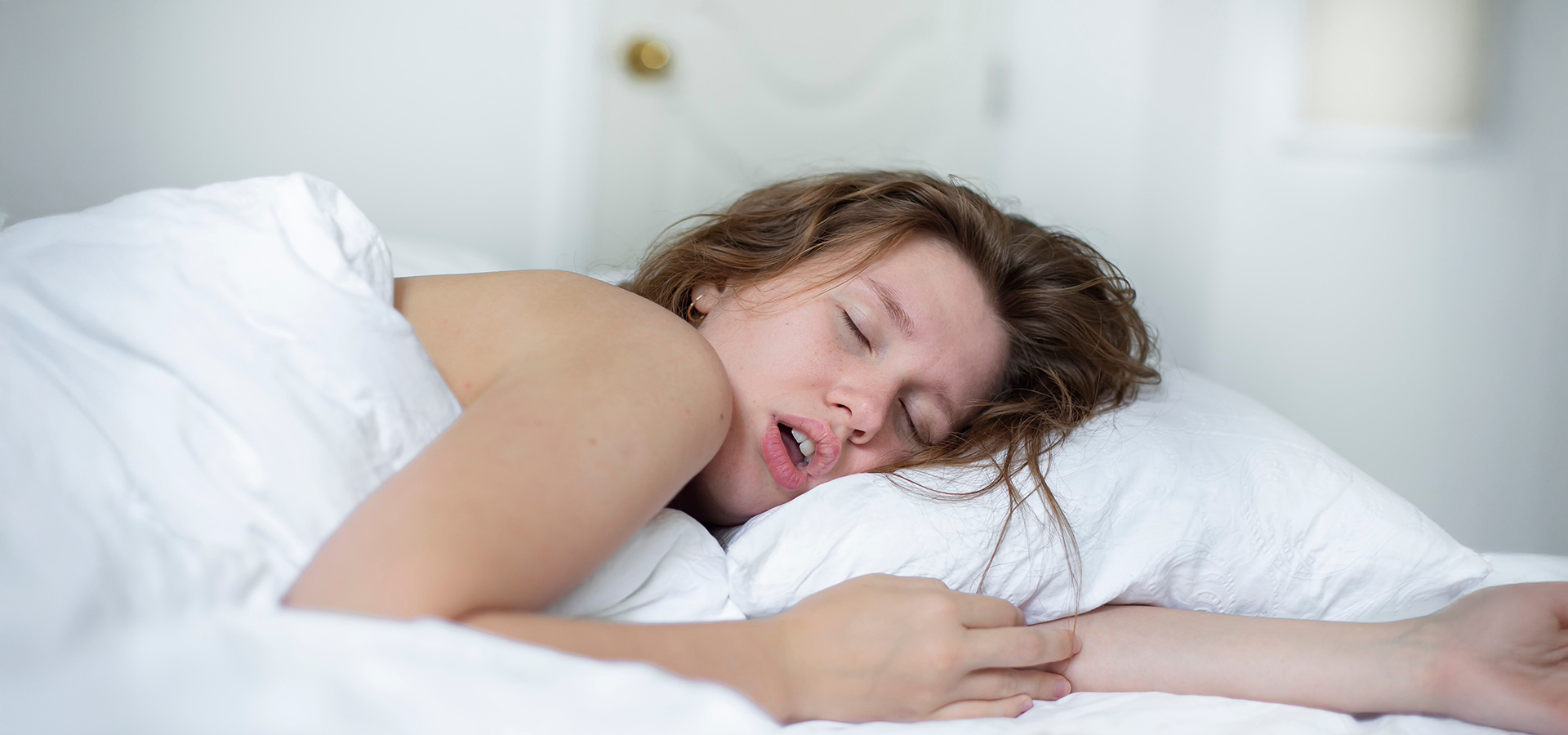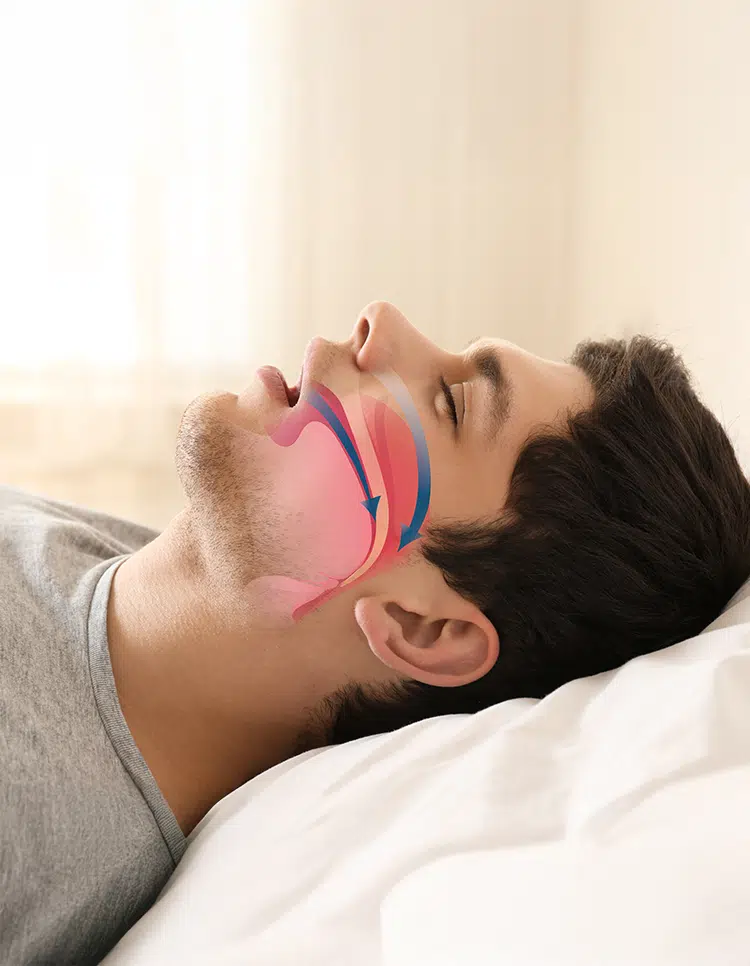
Oral Appliances
Oral appliances are custom-fitted devices that are worn in the mouth to help alleviate sleep-disordered breathing, snoring and obstructive sleep apnea (OSA). By supporting the jaw in a forward position or preventing the tongue from collapsing into the airway, these appliances help keep the airway open during sleep. This reduces the frequent awakenings, gasping, and snoring often associated with these conditions.
Wearing an oral appliance can significantly improve sleep quality, reduce daytime sleepiness, and enhance overall health and well-being. At Becker ENT & Allergy, our board-certified ENT doctors use their specialized training and knowledge of the airway, facial structures, and sleep medicine to develop an optimal treatment plan for each patient.

What Are Oral Appliances Used For?
Oral appliances serve as a non-invasive alternative or a complementary therapy for individuals struggling with nighttime breathing problems. Below are some of the common issues they address:
Different Types of Oral Appliances
There are various types of oral appliances available, each designed to address specific anatomical and physiological factors. Our ENT specialists at Becker ENT & Allergy will assess your individual needs and recommend the most suitable option for you. Below is an overview of the most common types:
Mandibular Advancement Devices (MADs)
Mandibular Advancement Devices are the most widely used oral appliances for snoring and sleep apnea. They work by gently moving the lower jaw (mandible) forward, thereby preventing the tongue from falling back into the airway.
- Typically made of hard acrylic or similar materials.
- Custom-fitted for comfort.
- Adjustable to find the ideal jaw position.
Tongue Retaining Devices (TRDs)
Tongue Retaining Devices hold the tongue in a forward position to prevent it from collapsing into the throat.
- Often recommended for patients who cannot tolerate MADs.
- May be beneficial for individuals with specific tongue anatomy or those with fewer teeth.
- Achieves similar results in maintaining an open airway.
Combination Appliances
Combination appliances may include both mandibular advancement and tongue retention features.
- Ideal for certain patients who need additional stability.
- Customized to address multiple anatomical factors.
Specialized Orthodontic Appliances
In some cases, particularly if the patient has jaw alignment issues, orthodontic appliances may be used to gradually shift the jaw into a more favorable position over time.
- Requires ongoing adjustments.
- Works well for those who can commit to longer-term use.

Candidates for Oral Appliances
Not everyone with snoring or sleep apnea is an ideal candidate for oral appliances. A thorough assessment by an experienced ENT specialist, dentist, or oral surgeon is crucial to determine whether this treatment option is right for you. Below are some factors that might indicate candidacy:

Consultation and Diagnosis for Oral Appliances
Before prescribing an oral appliance, our specialists at Becker ENT & Allergy will conduct a comprehensive evaluation. In some cases we may work in conjunction with a dentist or oral surgeon:
- We will ask questions about your sleep patterns, daytime symptoms, and any relevant medical history.
- This often involves looking at previous diagnostic tests, such as a sleep study (polysomnography).
Medical History and Sleep Assessment
- A thorough ENT exam helps identify anatomical factors contributing to snoring or sleep apnea.
- Assessment of the oral cavity, jaw, and throat structures provides insight into which type of oral appliance might work best.
Physical Examination
- In some cases, a sleep study may be recommended to confirm or rule out obstructive sleep apnea.
- Imaging studies like X-rays or MRIs can offer additional information about jaw and airway anatomy.
Imaging and Diagnostic Tests
- Based on the findings, your specialist will recommend appropriate therapies, which may include an oral appliance, lifestyle modifications, or other interventions.
- This consultation helps you understand all available options and set realistic expectations.
Discussion of Treatment Options
Using an Oral Appliance
Once you have been diagnosed and prescribed an oral appliance, understanding how to properly use and care for it is essential for successful treatment outcomes. Below is a brief overview of how to integrate oral appliance therapy into your routine.
Daily Use and Care Instructions
- Cleaning: Rinse the device with lukewarm water after each use and gently brush it with a soft toothbrush to remove debris.
- Storage: Keep the appliance in a protective case to prevent damage and exposure to germs.
- Maintenance: Periodically check for cracks or wear. If you notice any damage, contact our office promptly.
Wearing Schedule
- Nightly Use: Wear the appliance every night to ensure consistent results.
- Gradual Adjustment: Some devices have adjustable components. Your specialist may instruct you on how to make minor adjustments for comfort and efficacy.
Follow-Up Visits
- Monitoring Progress: Regular follow-ups allow your doctor to track improvement and make adjustments if needed.
- Oral Health Evaluations: Routine dental or ENT check-ups ensure that your teeth, gums, and jaw remain healthy while using the appliance.
Living With an Oral Appliance
Oral appliance therapy offers numerous advantages for those dealing with snoring and obstructive sleep apnea. Understanding these benefits can help you stay motivated and comfortable while wearing your device.
Key Benefits
- Improved Sleep Quality: Patients often report feeling more rested and energetic.
- Reduced Snoring: This not only helps you sleep better but also benefits your partner or roommates.
- Enhanced Overall Health: Managing sleep apnea can reduce the risk of complications like high blood pressure, heart disease, and stroke.
- Portable and Convenient: Oral appliances are small, discreet, and easy to travel with, making them an excellent alternative to CPAP machines.
- Comfort and Compliance: Many patients find oral appliances less cumbersome compared to CPAP, improving long-term adherence.
Living With an Oral Appliance
- Adaptation Period: It may take a few nights or weeks to get used to the feeling of wearing the device.
- Routine Cleaning: Regular cleaning and maintenance keep the device hygienic and prolong its lifespan.
- Regular Check-Ups: Ongoing monitoring ensures that the appliance continues to fit properly and deliver optimal results.
- Lifestyle Adjustments: Combining therapy with good sleep hygiene, a healthy diet, and exercise can further improve your outcomes.
Why Choose an ENT Specialist?
When it comes to diagnosing and treating snoring and sleep apnea, the expertise of an ENT specialist can be invaluable. At Becker ENT & Allergy, our board-certified physicians bring a wealth of knowledge to every case:
Take the First Step Toward Better Sleep
At Becker ENT & Allergy, we believe that a good night’s sleep is crucial to overall health and well-being. Our highly trained ENT specialists in Philadelphia are dedicated to providing personalized care and effective treatment options, including oral appliances, for patients with snoring and sleep apnea.
Contact us today at one of our convenient Philadelphia offices to schedule a comprehensive consultation. With the right diagnosis and a customized oral appliance, you can look forward to restful, rejuvenating nights and a healthier future.
Visit One of Our Convenient Philadelphia Locations
At Becker ENT & Allergy, we pride ourselves on offering top-tier care in multiple convenient locations throughout Philadelphia. If you suspect that you or a loved one may benefit from an oral appliance, or if you simply want more information, our team is here to help.
Walnut Street Office
1608 Walnut St Suite 902
Philadelphia, PA 19103
Phone: (215) 929-8301
South Street Office
1740 South St Suite 401
Philadelphia, PA 19146
Phone: (215) 671-6330
We encourage you to schedule a consultation to discuss your symptoms, undergo a comprehensive evaluation, and learn about the full range of treatments we offer.
Frequently Asked Questions About Oral Appliances
Below are some common questions about oral appliances, along with in-depth answers to help you make an informed decision regarding your sleep health.


